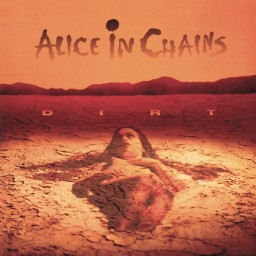Reviews list for Alice in Chains - Dirt (1992)
How does one discover metal in the modern day? I think in some regards, heavy metal is more elitist than some of us could even imagine even ten years ago with how wild some of it can get. While the mid 2000s were brim with the early stages of scene emo culture with pop punk from My Chemical Romance and a resurgent Green Day, my local alternative radio station (it still does) had a metaphorical boner for the early 90s and more importantly, the grunge era. I don’t need to elaborate further but just the names: Peral Jam, Soundgarden, Screaming Trees are legendary.
Of course, one would be remised if they didn’t mention Nirvana. And so here is the mention: I never liked Nirvana in the same way as those other grunge bands. I’m sure my story is not that dissimilar to many others, but I grew up in a household that was dominated by soft adult contemporary music and pop adjacent music of the 90s boy bands. So, when I gave my parents a more than reasonable excuse to listen to anything with a rock edge, and they refused, well then it became obvious where much of my attention to alternative counterculture derived from. But it stems even further than that. Everyone loved Nirvana when I was an adolescent, but I always found their music so squeaky clean and commercialized and lacked a lot of substance. To this day, I hold Nevermind as one of the most overrated albums of all time, right alongside the entirety of AC/DC’s discography. Say what you will about the over compressed mess that is In Utero, but it has some of Nirvana’s most essential tracks, not to mention their dark undertones.
I bring all of this up as preamble because you need to know exactly why Alice in Chains’ Dirt is the pinnacle of the grunge era. This record is dark, gloomy, depressive, nihilistic and sombre. And it does it all with a level of comfort that is among one of my favourite heavy metal records. Hearing Dirt by Alice in Chains must have been a similar feeling for me to how those who experienced the first Black Sabbath album must have felt.
And that comparison is not devoid of context. Unlike the other grunge bands of the 90s, Alice in Chains were not afraid of the slower, brooding song styles. While bands like Nirvana were becoming more accessible on Nevermind, and Pearl Jam were releasing Ten, Alice in Chains were traversing the pits. They were not contempt with shout-along choruses, and without that specific focus, Dirt might turn out to have more memorable chorus lines than the other grunge bands. Listening to an Alice in Chains album was all about wallowing in the sadness and the insurmountable weight of the lyrics of “Rain When I Die”, “Down in a Hole”, “Rooster” or the closer “Would?”. Unlike Nirvana, who wrote songs about…literally nothing, these words meant something very dear to our protagonist/narrator, and that emotion can be felt by at least one listener with the same intensity.
Perhaps a lack of knowledge surrounding doom metal at the time of the discovery of Dirt may lead to some contrasting opinions surrounding this album, especially on this website. While doom metal is heavily driven by melody, there is a short list of classic doom metal albums that I can recall that use the hook as effectively as this. And of course, these hooks would not be possible without the contributions of Layne Stayley. The vocals are magical in their contour and performed with an attention to detail that cannot be overstated. While calling the timbre “clean” might be accurate, hearing the solo howls during “Rooster” and “Would?” evoke a true sense of realism and gravitas. When these passages are complemented by the background vocals of Jerry Cantrell, it creates pure bliss.
Now with this being lumped in with the grunge crowd during the early 1990s, it is easy to say that the instrumental work is underwhelming. And this is probably true. The riffage is chunky and the melody is almost exclusively given to Stayley’s vocals. But it’s how the instrumental compliments the vocals that make Dirt a cut above the rest. It might not be as contrapuntal as early Soundgarden albums but makes up for that in unity. There is a sense of…completion in the composition of “Hate To Feel”, “Would?” and “Rain When I Die” that Soundgarden and Pearl Jam never had. Soundgarden would figure it out later with Superunkown, but Alice In Chains found it many years earlier.
I mentioned in my review of The Devil Put Dinosaurs Here how I felt that Alice in Chains fans were far too reactionary (I hate that word but cannot find a suitable replacement) towards William Duvall and the AiC reunion. Too many fans view this band as sacred ground and having a reunion without Stayley's corpse would be heresy. It’s very similar to the backlash received by the Star Wars sequel movies. But they all deserve a chance. And while most of them fail (Star Wars) I for one am glad Alice in Chains returned in the 2010s. But upon further analysis and revisiting this record all these years later, I must admit that the Stayley traditionalists do make a solid point: Alice in Chains is not the same without Layne Stayley. The majesty of the first two records cannot go underappreciated and its influence on the Duvall records is essential. But Dirt is more than just an influential juggernaut. It might not be the best metal album, but it is without a doubt the most important record for me. I wish I could return to those blissful days of blasting this album in my room, high as fuck, and getting lost in the world. Which begs the question: if I would, could you?
The dark crown jewel of the "grunge" movement
The songwriting of Jerry Cantrell and the vocals of Layne Staley are what put this album in a league of its own. Cantrell and Staley's crooning vocal harmonies (name a more iconic duo?!?) have made their permanent mark on rock history. "Would" and "Down in a Hole" truly represent the wails of a man who has lost hope and feels isolated from the world. Yet, like every song on this thing, they are morbidly catchy. Alice In Chains then mix in lots of metal and even doom influence to give their music a darker edge than their grunge contemporaries. Though a huge mainstream success, this album has something real and emotionally intense about it. A thick, spiteful, gloomy atmopshere prevails.
I have to confess to liking Dirt a lot less nowadays than I did some thirty years ago when I first heard it. Back then it was a mainstay of my listening rotation as I was genuinely enamoured with the riffs of Jerry Cantrell and his bluesy lead work. The vibrant and electric sounds of the first two tracks on Dirt do still resonate with me to this day as a perfect start to an album as they typified the fact that not all grunge had to be gloomy and melancholic. There was an immediacy back then to the opening of this record that was not often repeatable on most other releases of the time. This spontaneous and perfectly tight sounding start is actually only rivalled upon reflection by the end of the record when the tumultuous Angry Chair, followed by the initially sultry and brooding Would? (that develops into a pounding album closer over its three-and-a-half-minute run time) close out the release brilliantly.
The problem I have with Dirt is what comes between these tracks as I now find the album to have lost a lot of the overall positivity that I held for it back in the day. Arguably the more grungey aspects of the album are the ones that I now dislike the most as with the exception of Down In A Hole and Rooster I no longer enjoy the rest of Dirt. Rain When I Die now sounds as whiny as the title suggests it should, only not in a cool reflective way like it used to and I just cannot stand Sickman anymore with its chaotic and too frantic structure. It is not rare for me to find an AIC album that is frontloaded (although rarer in fact to find any album that is front and rear-loaded to such a small extent) as Facelift takes a huge dip south after the opening two tracks, so there is a consistency to their early output for me. This is not to say that they are not still hugely important to the alternative metal movement - parking grunge references to one side for a moment - as AIC were really good at incorporating other influences into their vaguely metal-like foundations in order to offer something which was the core essence of alternative music.
I just do not feel that Dirt has aged that well for me, even acknowledging the nostalgia around the release and the importance of it. I will openly acknowledge that they have never topped this release in either era of the band but the longevity of it is questionable nowadays even though there is still enough here to keep this a four star rating.


 Saxy S
Saxy S
 Vinny
Vinny